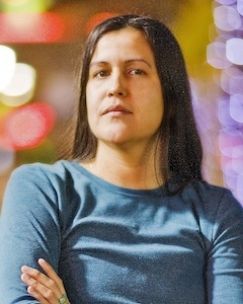SO MANY of our “love poems” are just brief moments of objectification of a maybe-sorta- loved-one. But Natalie Diaz’s poem “I Watch Her Eat the Apple” goes back to one of our oldest stories of a couple, Adam and Eve, and she makes it right. Here, the old story of the apple, the garden, and that forbidden knowledge terribly released into the world by Eve — is told with tender and great difference. Diaz infuses the story with so much love, so much awed nuance, so much trust, that I leave the poem wanting to reside with those eating women there, in that contemporary garden. I want to stay and love knowledge along with them. The old story doesn’t trust women, and the old story isn’t in love. In
Diaz’s version, the poem rests in knowledge, the poem deeply trusts women, and the poem is in (devouring) love. These are the right places to start a Valentine.
— Sarah Vap
Natalie Diaz, “I Watch Her Eat the Apple”
She twirls it in her left hand,
a small red merry-go-round.
According to the white oval sticker,
she holds apple #4016.
I’ve read in some book or other
of four thousand fifteen fruits she held
before this one, each equally dizzied
by the heat in the tips of her fingers.
She twists the stem, pulls it
like the pin of a grenade, and I just know
somewhere someone is sitting alone on a porch,
bruised, opened up to their wet white ribs,
riddled by her teeth —
lucky.
With her right hand, she lifts the sticker
from the skin. Now,
the apple is more naked than any apple has been
since two bodies first touched the leaves
of ache in the garden.
Maybe her apple is McIntosh, maybe Red Delicious.
I only know it is the color of something I dreamt,
something I gave to her after being away
for ten thousand nights.
The apple pulses like a red bird in her hand —
she is setting the red bird free,
but the red bird will not go,
so she pulls it to her face as if to tell it a secret.
She bites, cleaving away a red wing.
The red bird sings. Yes,
she bites the apple and there is music —
a branch breaking, a ship undone by the shore,
a knife making love to a wound, the sweet scrape
of a match lighting the lamp of her mouth.
This blue world has never needed a woman
to eat an apple so badly, to destroy an apple,
to make the apple bone —
and she does it.
I watch her eat the apple,
carve it to the core and set it, wobbling,
on the table —
a broken bell I beg to wrap my red skin around
until there is no apple,
there is only this woman
who is a city of apples,
there is only me licking the juice
from the streets of her palm.
If there is a god of fruit or things devoured,
and this is all it takes to be beautiful,
then God, please
let her
eat another apple
tomorrow.
LARB Contributor
Sarah Vap is the author of four collections of poetry. The most recent, Arco Iris (Saturnalia Books) was named a Library Journal Book Best Book of 2012. She is a recipient of a 2013 National Endowment of the Arts Grant for poetry. Her first collection, Dummy Fire, received the Saturnalia Poetry Prize. Her second collection, American Spikenard, received the Iowa Poetry Prize. She lives in Santa Monica and is pursuing her PhD at University of Southern California.
LARB Staff Recommendations
Did you know LARB is a reader-supported nonprofit?
LARB publishes daily without a paywall as part of our mission to make rigorous, incisive, and engaging writing on every aspect of literature, culture, and the arts freely accessible to the public. Help us continue this work with your tax-deductible donation today!
